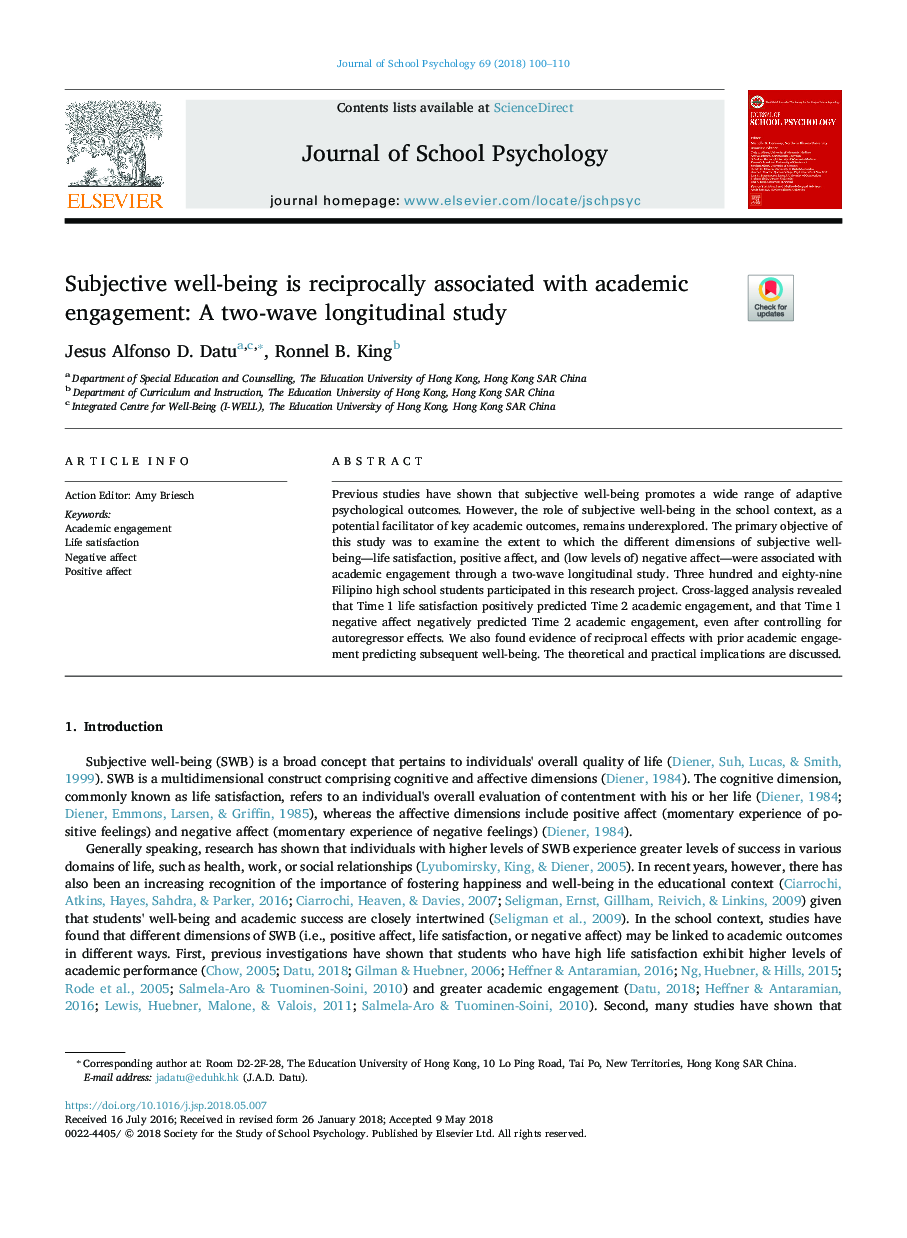| کد مقاله | کد نشریه | سال انتشار | مقاله انگلیسی | نسخه تمام متن |
|---|---|---|---|---|
| 6843713 | 1436266 | 2018 | 11 صفحه PDF | دانلود رایگان |
عنوان انگلیسی مقاله ISI
Subjective well-being is reciprocally associated with academic engagement: A two-wave longitudinal study
ترجمه فارسی عنوان
رفاه ذهنی به طور متقابل با تعامل دانشگاهی مرتبط است: مطالعه طولی دو موج
دانلود مقاله + سفارش ترجمه
دانلود مقاله ISI انگلیسی
رایگان برای ایرانیان
کلمات کلیدی
تعامل علمی، رضایت از زندگی، تأثیر منفی، تأثیر مثبت،
ترجمه چکیده
مطالعات قبلی نشان داده است که رفاه ذهنی دامنه وسیعی از نتایج روانشناختی سازگار را ترویج می کند. با این حال، نقش رفاه ذهنی در زمینه مدرسه، به عنوان یک تسهیل کننده بالقوه نتایج کلیدی تحصیلی، هنوز نامشخص است. هدف اصلی این مطالعه بررسی میزان ابعاد رضایتمندی ذهنی زندگی، تأثیر مثبت و (سطح پایین) تأثیر منفی در تعامل دانشگاهی از طریق مطالعه طولی دو موج بود. سهصد و هشتاد و نه دانش آموز دبیرستان فیلیپین در این پروژه تحقیقاتی شرکت کردند. تجزیه و تحلیل متقابل پس از آن نشان داد که رضایت از زندگی 1 ساعته مثبت تعارض دانشگاهی 2 را پیش بینی کرده و منفی 1 تأثیر منفی بر پیش بینی فعال شدن 2 ساعته را حتی پس از کنترل اثرات خودپرداخت دارد. ما همچنین شواهدی از اثرات متقابل را با مشارکت تحصیلی پیشین نشان دادیم که پیش بینی خوبی از آن را داشته باشد. مفاهیم نظری و عملی بحث شده است.
موضوعات مرتبط
علوم انسانی و اجتماعی
روانشناسی
روان شناسی کاربردی
چکیده انگلیسی
Previous studies have shown that subjective well-being promotes a wide range of adaptive psychological outcomes. However, the role of subjective well-being in the school context, as a potential facilitator of key academic outcomes, remains underexplored. The primary objective of this study was to examine the extent to which the different dimensions of subjective well-being-life satisfaction, positive affect, and (low levels of) negative affect-were associated with academic engagement through a two-wave longitudinal study. Three hundred and eighty-nine Filipino high school students participated in this research project. Cross-lagged analysis revealed that Time 1 life satisfaction positively predicted Time 2 academic engagement, and that Time 1 negative affect negatively predicted Time 2 academic engagement, even after controlling for autoregressor effects. We also found evidence of reciprocal effects with prior academic engagement predicting subsequent well-being. The theoretical and practical implications are discussed.
ناشر
Database: Elsevier - ScienceDirect (ساینس دایرکت)
Journal: Journal of School Psychology - Volume 69, August 2018, Pages 100-110
Journal: Journal of School Psychology - Volume 69, August 2018, Pages 100-110
نویسندگان
Jesus Alfonso D. Datu, Ronnel B. King,
